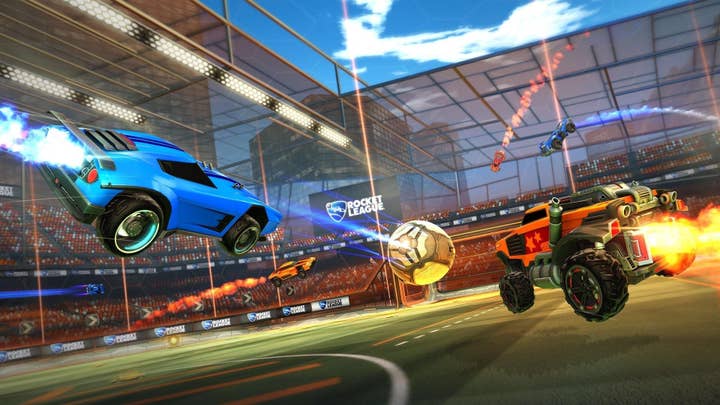Games could be hit hard by net neutrality's death
This is class warfare and gamers and small game companies are in the crosshairs
By now you've probably heard about Federal Communications Commission chairman Ajit Pai's plan to kill net neutrality, a set of rules established by President Obama's administration to keep the internet a free and open service for all - so that internet service providers like Verizon or Comcast can't suddenly block, throttle or favor traffic from one source. Pai's proposal isn't the law of the land yet, but it's expected to pass when the FCC votes on December 14.
Once this plan is approved, the internet will slowly lose its democratic nature and become an oligarchy ruled by greedy ISPs who can do what they please in the absence of any real regulation. As the New York Times reported, "Under a repeal, companies like AT&T and Comcast may be able to charge people higher fees to access certain websites and online services. The companies may also be able to prioritize their own services while disadvantaging websites run by rivals."
It's not hard to imagine how bad things could get for both gamers and game companies under this new-look internet. One look at wireless carrier Meo in Portugal, as noted by Business Insider, gives us an example of what a multi-tiered internet could mean. Users would have to pay for basic access to the internet, and then select "packages" with additional monthly fees, whether for access to video streaming like Netflix or Hulu, email, social networking, music, and so on.
"Anyone who cares about multiplayer online gaming should be up in arms about the imminent demise of net neutrality in the USA"
Jeremy Stieglitz, Studio Wildcard
Hypothetically, Comcast or any of the ISPs could introduce a "Premium Gaming Plan" that gives you high-speed access to your favorite services like Xbox Live, PlayStation Network, Steam, etc. If you're a serious gamer and want fast download speeds and low latency for online gaming on these services, you'd have no choice but to pay the extra money to subscribe. At the same time, the ISP could charge Xbox extra money to provide the service with a "fast lane" on its network - but that cost is then passed on to the players.
Or, what if Comcast, which already hosts games, decides to get more serious about becoming a gaming service itself? As digital gets bigger and bigger and publishers like EA talk about streaming and subscriptions becoming the next big thing for the industry, what's to stop someone like Comcast from favoring their own service's traffic over another's? The customers who need to use Comcast for their internet access in this situation are completely screwed - and by the way, in many more rural parts of America there may be no other ISP choice for a consumer to switch to.
Gaming, of course, can account for huge amounts of data, especially as more high-end games offer 4K and HDR visuals; the download files are getting ridiculously massive. And regular online gameplay itself uses up big portions of bandwidth. Like a mobster threatening to break your leg if you don't pay up, who's to say that any of these ISPs can't cap or throttle a gamer's data once net neutrality is removed?
Studio Wildcard co-founder and co-creative director Jeremy Stieglitz commented to me, "Anyone who cares about multiplayer online gaming should be up in arms about the imminent demise of net neutrality in the USA. It's completely destructive to the idea of fair and level competitive gameplay to have throttled bandwidth depending on whether you are a small title or a part of a big commercial enterprise.

"Once the network carriers decide they can prioritize bandwidth to their own offerings above anything else, independent games such as Ark are likely to suffer. This performance degradation may not happen overnight, but it almost surely will happen once the carriers decide to commercially exploit the extreme power they will have been given. Gamers everywhere should try fight this, to the extent that they can make their voices heard."
And it's not just about gamers. Game companies, especially startups, will almost certainly be affected by all of this. If you're one of the smaller companies in gaming, you have no chance to compete with juggernauts like Steam anymore because the playing field is no longer level. For example, Steam might pay to be included in the ISP's gaming package, get that fast lane, but then up-and-coming download portals could see their speeds throttled. It's just not a fair fight, and it's bad news for a free economy.
Jason Citron, co-founder and CEO of gaming chat app Discord, explained to Wired, "Net neutrality is incredibly important for small startups like Discord because all internet traffic needs to be treated as equal for us all to have access to the same resources as the big companies."
"FCC chairman Pai was one of Verizon's top lawyers - should we really be surprised that he's looking out for Verizon's interests over the people? It's a classic case of the fox watching the hen house"
Jeremy Dunham, VP of Publishing at Psyonix, which operates the hit online game Rocket League, told me, "We will be watching the rules vote on December 14 very closely. Rocket League has millions of active monthly players and any law or scenario that could jeopardize people's access to it is definitely a concern. We are hopeful that players will continue to have great access to our game."
What this all amounts to, sadly, is class warfare. It turns the internet into a world of haves and have-nots, and we already have enough of that in the games industry to begin with. The richest gamers will have the best bandwidth and lowest latency, gaining an unfair advantage in competitive online games, while the biggest and richest games companies will be able to throw their considerable weight around so that the little guys don't even have a fighting chance. The world of games streaming could be turned on its head, too. Aspiring online influencers who look to Twitch, YouTube and Facebook to stream for a living, may suddenly find streaming to be a much tougher endeavor without net neutrality rules to protect their open internet.
And as much as this wasn't intended to be a political post, the fact is that net neutrality is automatically a political issue. When the government is allowed to be run by the upper one percent, it's not "by the people, for the people," as Abraham Lincoln envisioned. It's no secret that many of those given power by the Trump administration to "regulate" or watch over industry have had direct ties to the very sectors they are supposed to be monitoring. FCC chairman Pai was one of Verizon's top lawyers - should we really be surprised that he's looking out for Verizon's interests over the people? It's a classic case of the fox watching the hen house.
The good news - and something I'm thankful for, having just celebrated Thanksgiving - is that there's still time to fight this heinous FCC plan. If there's enough public outcry, maybe, just maybe Pai and the FCC will relent. I encourage you all to take action: here's a good place to start. If the gaming community can muster enough strength to steer EA away from loot boxes in Star Wars Battlefront II, then perhaps we can make our voices heard on more important issues like net neutrality.
And hey, if Pai still gets his way, there is perhaps one small silver lining: we'll all get to stop talking about epic single-player adventures going extinct. Now excuse me while I go boot up Skyrim...








